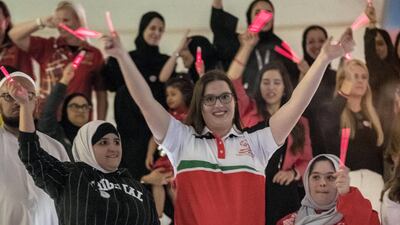Teachers and pupils from across the UAE are to learn how to help more people with special needs get involved in sport.
The initiative, run by the British Council and the Special Olympics UAE, aims to educate children on how best to create an inclusive atmosphere for those with disabilities.
Organisers hope the scheme will help generate a lasting legacy for the Special Olympics World Games, to held in Abu Dhabi next year.
Initially the pilot project will cover some 4,000 pupils in 25 government, private and special education centres in the Emirates, but will later be extended.
“We want our country to be a friendly place for all people with special needs,” said Talal Al Hashemi, national director of Special Olympics UAE.
“We will be hosting one of the biggest humanitarian sports events in the world so now is the right time to spread the lessons to the young.
“Inclusion needs time and has to be done right, so we'll start with clinics and workshops and slowly cover as many schools as we can.”
The Special Olympics is to take place in Abu Dhabi and Dubai next year from March 14 to 21.
Some 7,500 athletes are expected to compete in the first event of its kind held in the Middle East and North Africa region.
Part of the vision behind holding the Games is to build a more tolerant society around the world using the power of sport.
As part of that plan, trainers from the UK will spend 10 days in the UAE working with coaches, teachers and students to spread the message that sport should be as inclusive as possible.
Gavin Anderson, director of the British Council in the UAE, said the programme aimed to break preconceived notions.
“Sport in schools is often competitive and can become about the best and most athletic children getting the most out of activities," he said.
“Our programme will encourage the belief that participation in sport is for everybody, particularly for people with intellectual disabilities.
“It will prepare leaders and teachers to support people with intellectual disabilities on an equal footing so they are included and don’t feel they are being treated in patronising way.
“It provides examples of how you can encourage everyone to participate. It focuses on different sports that are designed to be a more collaborative experience rather than about who scored the most goals.”
Trainers from the UK will include workers from the charity Youth Sports Trust International.
The trust has worked in 60 countries around the world to use the power of sport to improve the lives of young people.
A record-breaking 192 countries are set to take part the Games, with ministers hoping it will redefine the boundaries of what is possible for those living with disabilities.
Athletes will compete in a wide variety of sports including badminton, basketball, beach volleyball, football, cycling, judo, kayaking and swimming.
There will also be events in weightlifting, sailing, table tennis and gymnastics.
Some 3,000 coaching staff will be on hand to assist the athletes as well as 20,000 volunteers to take charge of close to half a million expected spectators.
Authorities also hope the Games will act as a catalyst to job creation.
Before the Games begin next year, all seven emirates will welcome competing athletes to their towns and homes as part of a host town programme.
Competitors will be offered cultural tours and other events in an effort to provide insight into the life in the UAE.


